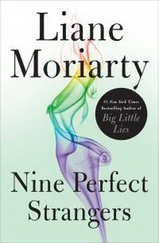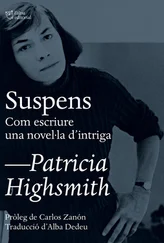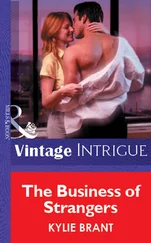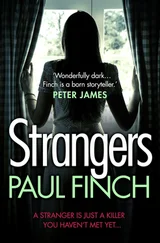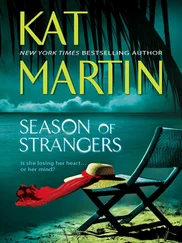He nodded and moistened his dry lips. He did not return her smile as she closed the door, because he felt as if a black lid had fallen on him suddenly, as if he had to escape something before it was too late. He had to see Guy before it was too late! He had to get rid of his father before it was too late! He had things to do! He did not want to be here, in his grandmother’s house furnished just like his own house in Louis Quinze, eternal Louis Quinze! But he did not know where else he wanted to be. He was not happy if he were long away from his mother, was he? He bit his underlip and frowned, though his small gray eyes were quite blank. Why did she say he didn’t need a drink in the mornings? He needed it more than any other drink of the day. He flexed his shoulders in a slow rotary movement. Why should he feel low?
The clippings on the bed were about him. Week after week went by and the dumb police got nothing on him, nothing except the heelprints, and he had thrown his shoes away long ago! The party last week with Wilson in the San Francisco hotel was nothing to what he would do now if he had Guy to celebrate with. A perfect murder! How many people could do a perfect murder on an island with a couple of hundred other people around?
He was not like the dopes in the newspapers who killed “to see what it felt like,” and never had a bloody thing to report except sometimes a sick-making, “It wasn’t as good as I expected.” If he were interviewed, he would say, “It was terrific! There’s nothing in the world like it!” (“Would you ever do it again, Mr. Bruno?”) “Well, I might,” reflectively, with caution, as an arctic explorer when asked if he will winter up north again next year might reply uncommittingly to a reporter. (“Can you tell us a little bit about your sensations?”) He would tip the microphone toward him, look up, and muse, while the world awaited his first word. How had it felt? Well, there’s only it, see, and nothing to compare it with. She was a rotten woman anyway, you understand. It was like killing a hot little rat, only she was a girl so it made it a murder. The very warmth of her had been disgusting, and he remembered thinking that before he took his fingers away, the heat would really have stopped coming, that after he left her, she would grow chill and hideous, like she really was. (“Hideous, Mr. Bruno?”) Yes, hideous. (“Do you think a corpse is hideous?”) Bruno frowned. No, he did not really think he thought a corpse was hideous. If the victim was evil, like Miriam, people ought to be pretty glad to see the corpse, oughtn’t they? (“Power, Mr. Bruno?”) Oh, yes, he had felt terrific power! That was it. He had taken away a life. Now, nobody knew what life was, everybody defended it, the most priceless possession, but he had taken one away. That night there had been the danger, the ache of his hands, the fear in case she made a sound, but the instant when he felt that life had left her, everything else had fallen away, and only the mysterious fact of the thing he did remained, the mystery and the miracle of stopping life. People talked about the mystery of birth, of beginning life, but how explainable that was! Out of two live germ cells! What about the mystery of stopping life? Why should life stop because he held a girl’s throat too tightly? What was life anyway? What did Miriam feel after he took his hands away? Where was she? No, he didn’t believe in a life after death. She was stopped, and that was just the miracle. Oh, he could say a great deal at his interview with the press! (“What significance did it have for you that your victim was female?”) Where had that question come from? Bruno hesitated, then recovered his poise. Well, the fact she was a female had given him greater enjoyment. No, he did not therefore conclude that his pleasure had partaken of the sexual. No, he did not hate women either. Rather not! Hate is akin to love, you know. Who said that? He didn’t believe it for a minute. No, all he would say was that he wouldn’t have enjoyed it quite so much, he thought, if he had killed a man. Unless it was his father.
The telephone…
Bruno had been staring at it. Every telephone suggested Guy. He could reach Guy now with two well-placed calls, but a call might annoy Guy. Guy might still be nervous. He would wait for Guy to write. A letter should come any day now, because Guy must have gotten his letter the end of last week. The one thing Bruno needed to make his happiness complete was to hear Guy’s voice, to have a word from him saying he was happy. The bond between Guy and him now was closer than brotherhood. How many brothers liked their brothers as much as he liked Guy?
Bruno threw a leg out the window and stood up on the wrought iron balcony. The morning sunshine did feel rather good. The lawn was broad and smooth as a golf course all the way to the ocean. Then he saw Sammie Franklin, dressed in white tennis clothes with his rackets under his arm, grinning his way toward his mother. Sammie was big and flabby, like a softened-up boxer. He reminded Bruno of another Hollywood stooge who had hung around his mother when they were here three years ago, Alexander Phipps. Why did he even remember their phony names? He heard Sammie’s chuckle as he extended his hand to his mother, and an old antagonism fluttered up in Bruno and lay still again. Merde. Disdainfully he took his eyes from Sammie’s broad flannel backsides, and examined the view from left to right. A couple of pelicans flew loggily over a hedge and plopped down on the grass. Far out on the pale water he saw a sailboat. Three years ago he had begged his grandmother to get a sailboat, and now that she had one, he never felt like using it.
The tennis balls wokked around the tan stucco corner of the house. Chimes sounded from downstairs, and Bruno went back into his room, so he would not know what time it was. He liked to see a clock by accident as late as possible in the day, and find it was later than he had thought. If there was no letter from Guy in the noon mail, he thought, he might catch a train to San Francisco. On the other hand, his last memory of San Francisco was not pleasant. Wilson had brought a couple of Italian fellows up to the hotel, and Bruno had bought all the dinners and several bottles of rye. They had called Chicago on his telephone. The hotel had chalked up two calls to Metcalf, and he couldn’t remember the second at all. And the last day, he had been twenty dollars short on the bill. He didn’t have a checking account, so the hotel, the best hotel in town, had held his suitcase until his mother wired the money. No, he wouldn’t go back to San Francisco.
“Charley?” called the high, sweet voice of his grandmother.
He saw the curved handle of the door start to move, made an involuntary lunge for the clippings on his bed, then circled back to the bathroom instead. He shook tooth powder into his mouth. His grandmother could smell liquor like a dry sourdough in the Klondike.
“Aren’t you ready to have some breakfast with me?” his grandmother asked.
He came out combing his hair. “Gee, you’re all dressed up!” She turned her small unsteady figure around for him like a fashion model, and Bruno smiled. He liked the black lace dress with the pink satin showing through it. “Looks like one of those balconies out there.”
“Thank you, Charley. I’m going into town the latter part of the morning. I thought you might like to come with me.”
“Could be. Yeah, I’d like that, Grannie,” he said goodnaturedly.
“So it’s you’ve been clipping my Times! I thought it was one of the servants. You must be getting up awfully early these mornings.”
“Yep,” Bruno said agreeably.
“When I was young, we used to get poems out of newspapers for our scrapbooks. We made scrapbooks out of everything under the sun. What’re you going to do with these?”
Читать дальше




